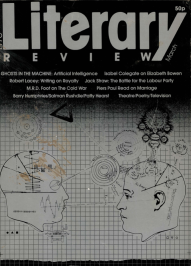Sasthi Brata
Salman Rushdie: A Profile
When your picture appears on the cover of both the London Review of Books and the New York Times Review of Books within a fortnight of each other, and burly customs officials hustle for your autograph on arrival at Kennedy airport, then you might be forgiven for ‘taking a policy decision’ to enjoy all the fun while it lasts.
If fifth columnists enquire whether an enterprising agent might not have primed those men in advance to massage your budding ego, then you might reply, if you were the freshly feted ‘major novelist’ by the name of Salman Rushdie, that ‘without doubt that was the strangest thing to have happened and seems to me quite unbelievable.’ And go on to explain, ‘that is less a mark of the quality of the book as of the power of the New York Times. Everybody in America seems to see the Sunday New York Times, and very large numbers of them read the Book Review section, and so if you happen to be on the first page of it ... There is no comparable way of breaking through into large scale public consciousness in this country.’
In case this fulsome tribute to the prestige of the NYT led you to assume qualities of demure modesty in our newly hailed author, then he would soon put you right by a sharp assessment of his book and a capsule manifesto of his literary aspirations: ‘Just to be overweeningly

Sign Up to our newsletter
Receive free articles, highlights from the archive, news, details of prizes, and much more.@Lit_Review
Follow Literary Review on Twitter
Twitter Feed
Under its longest-serving editor, Graydon Carter, Vanity Fair was that rare thing – a New York society magazine that published serious journalism.
@PeterPeteryork looks at what Carter got right.
Peter York - Deluxe Editions
Peter York: Deluxe Editions - When the Going Was Good: An Editor’s Adventures During the Last Golden Age of Magazines by Graydon Carter
literaryreview.co.uk
Henry James returned to America in 1904 with three objectives: to see his brother William, to deliver a series of lectures on Balzac, and to gather material for a pair of books about modern America.
Peter Rose follows James out west.
Peter Rose - The Restless Analyst
Peter Rose: The Restless Analyst - Henry James Comes Home: Rediscovering America in the Gilded Age by Peter Brooks...
literaryreview.co.uk
Vladimir Putin served his apprenticeship in the KGB toward the end of the Cold War, a period during which Western societies were infiltrated by so-called 'illegals'.
Piers Brendon examines how the culture of Soviet spycraft shaped his thinking.
Piers Brendon - Tinker, Tailor, Sleeper, Troll
Piers Brendon: Tinker, Tailor, Sleeper, Troll - The Illegals: Russia’s Most Audacious Spies and the Plot to Infiltrate the West by Shaun Walker
literaryreview.co.uk